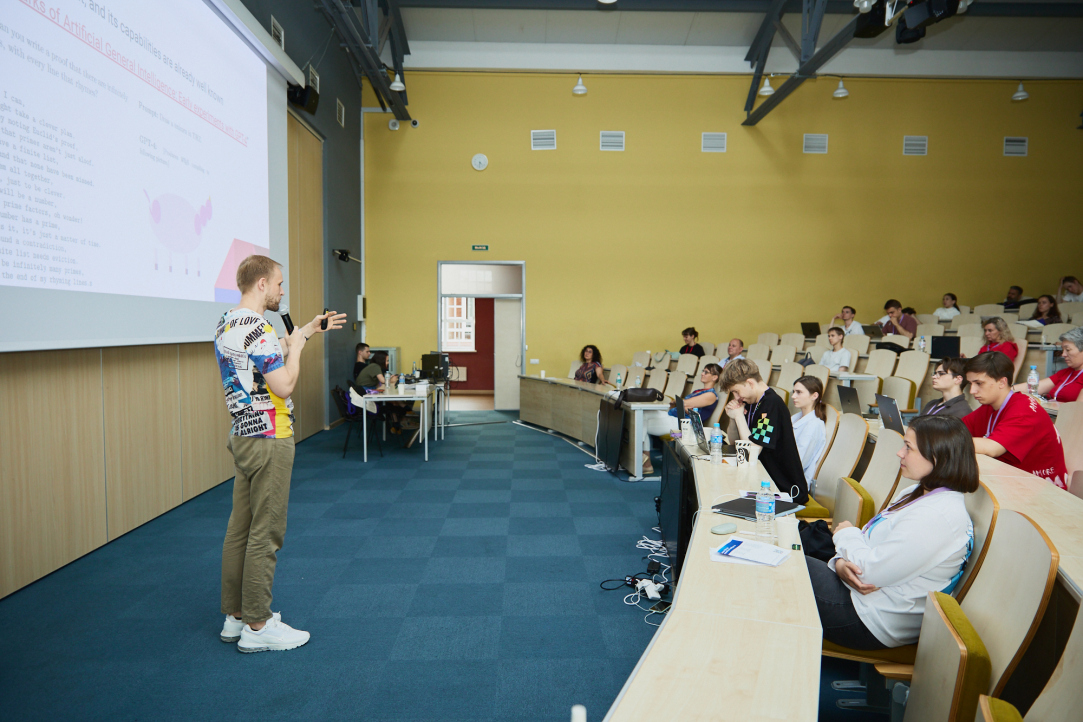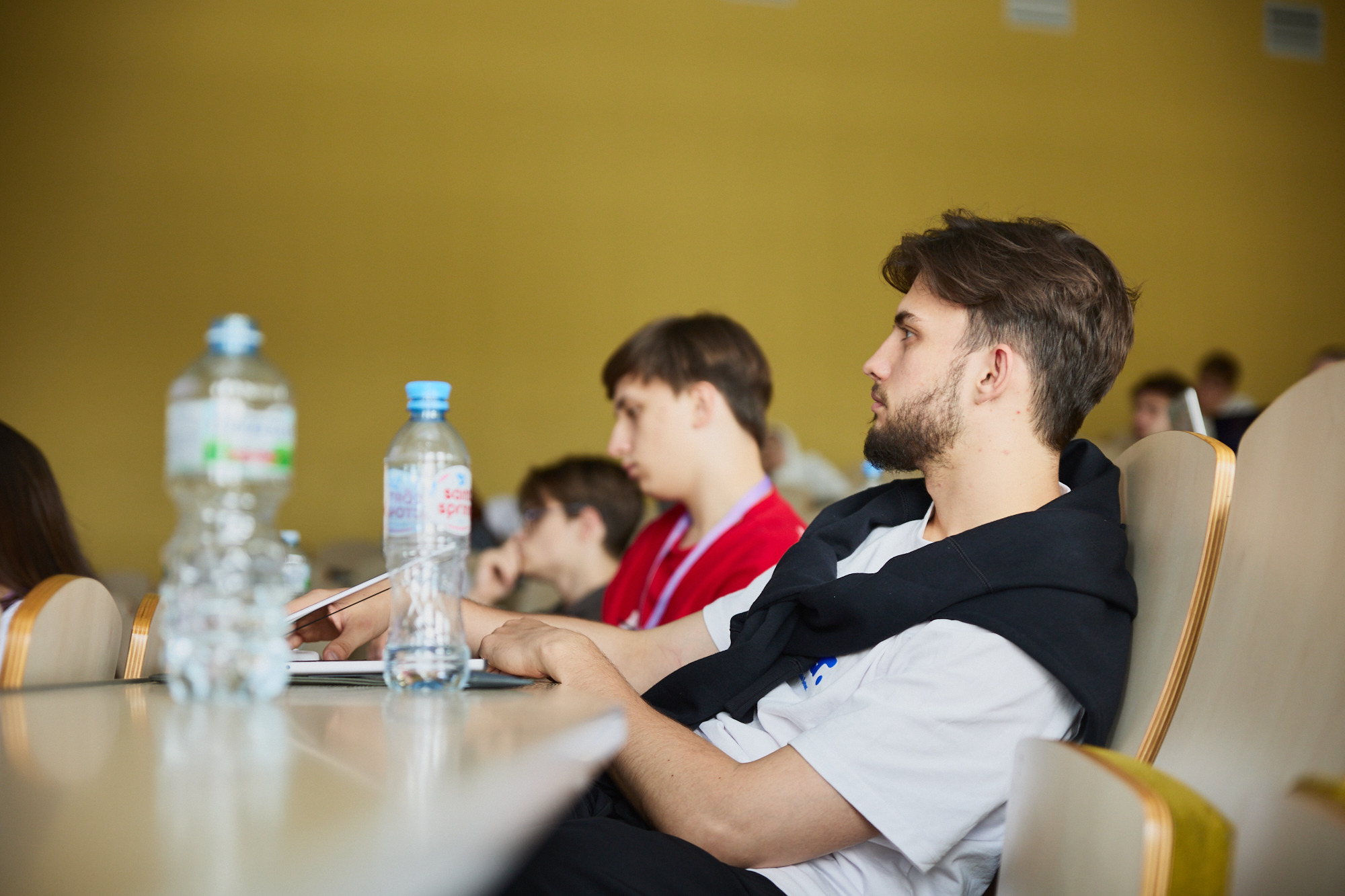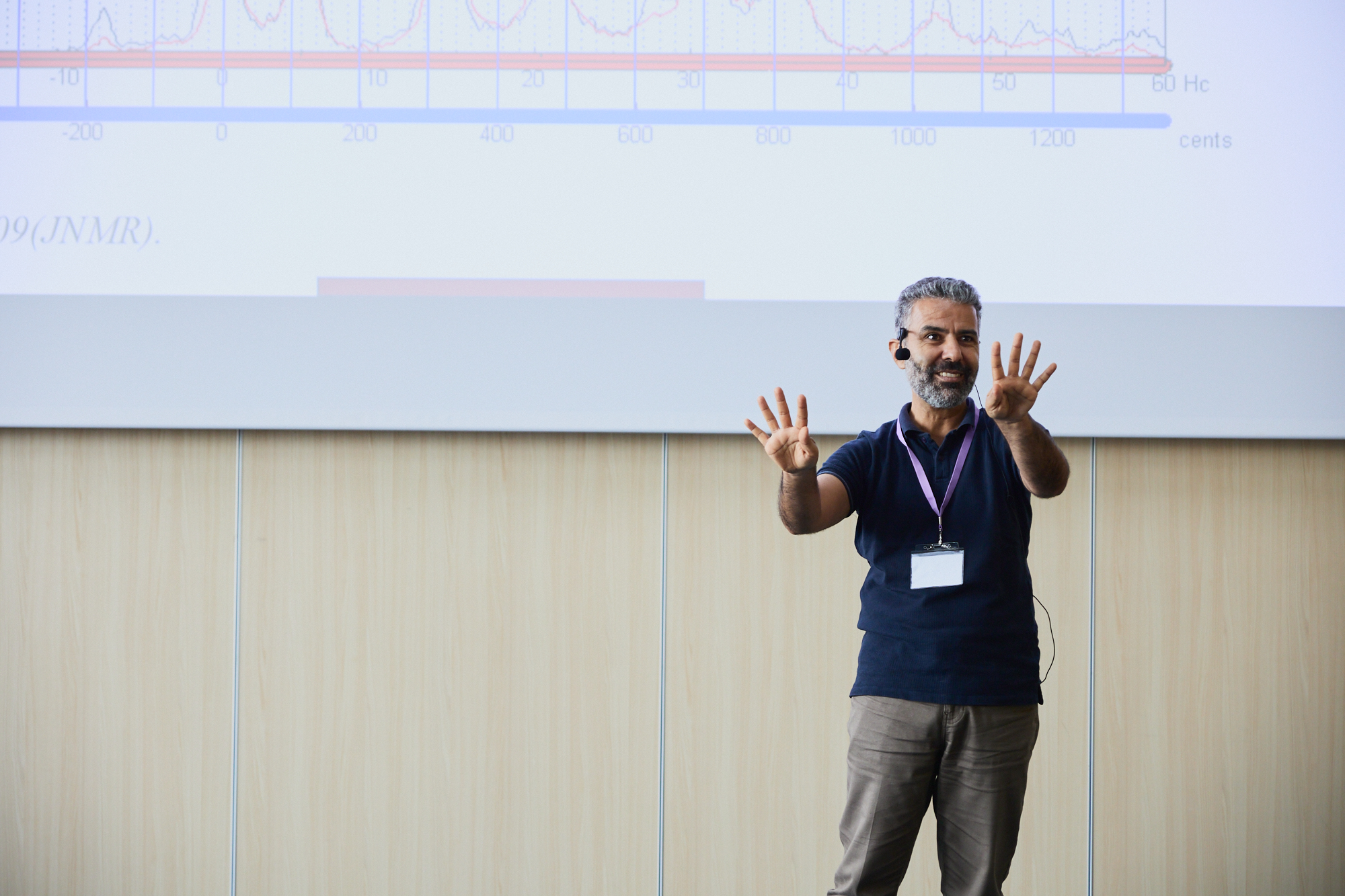"ISSCAI provided great immersion into the IT environment": the AI School-Conference at HSE Saint Petersburg has ended
At HSE University – Saint Petersburg, the international AI School-Conference, ISSCAI 2024, took place. It was organized by the School of Physics, Mathematics, and Computer Science in collaboration with the Laboratory of Social and Cognitive Informatics, with support from VK and other partners. The week-long intensive program attracted talented students, postgraduates, and developers from across the country—from Moscow to Yekaterinburg—as well as from Kazakhstan and Egypt. Leading experts from Russia, the UAE, and India delivered courses on key trends in artificial intelligence, ranging from computer vision to music signal processing.

Artificial intelligence technologies are constantly evolving, and HSE University – Saint Petersburg is exploring various facets of their application, such as in education and media. AI is also indispensable in modern business: a recent study by the NAFI Analytical Center shows that one in three small and medium-sized businesses in Russia uses it in their operations. Therefore, training IT specialists proficient in various AI technologies is becoming increasingly relevant. To introduce students and novice developers to the latest trends in this field, the School of Physics, Mathematics, and Computer Science, in collaboration with the Laboratory of Social and Cognitive Informatics, held the International AI School-Conference (ISSCAI) from July 1 to 7.
Fifty motivated and qualified students, postgraduates, and young developers from leading Russian universities such as MSU, TSU, MGTU, SPbPU, VSU, and others were selected to participate based on their resumes and brief research abstracts. Over the course of the week, they attended five courses and four guest lectures from experts at "Trust Technologies," "Sber," VTB, Synthesis AI, VK, MSU, and the Speech Technology Center.

The project's main partner was one of the IT industry's leaders, VK. VK offered the school attendees a chance to discuss all aspects of the work of ML and DS specialists in industrial development—from task setting to maintaining a finished service. Vladislav Efimov, the technical lead of the E-commerce team at VK, gave a presentation to the students. Other industrial partners that joined the school-conference included "Trust Technologies" (TeDo) and VTB Bank.
In addition to the Russian IT community, international ML researchers also participated in ISSCAI. For the first time, HSE University – Saint Petersburg was visited by a professor from the UAE—Associate Professor Baris Bozkurt from Zayed University in Abu Dhabi. His course addressed complex issues such as how to analyze and represent musical signals using classical machine learning and deep learning methods.
Baris Bozkurt, Associate Professor at Zayed University in Abu Dhabi
In Turkey and the UAE, the general opinion about Russian IT specialists is that they are well-educated and have a strong mathematical and theoretical background. During the school-conference, I was able to see this firsthand: very energetic and interesting students, and wonderful professors. I hope we will continue our collaboration.
Computational musicology is a vibrant interdisciplinary field. One of the key and perhaps most challenging questions in this area is the development of systems for automatic data annotation and classification, as manual annotation is becoming increasingly complex. For example, in music education, it is necessary to provide feedback on students' performances. We have some tools used in music education software, but these are just the first steps. There are still many open topics in this area of research, which makes it attractive to many specialists.

Professor Mausam from India also shared his expertise with the students. He offered them an in-depth exploration of complex NLP topics, such as language model alignment, response generation based on relevant information, and the reasoning process of language models. Professor Mausam represented the Indian Institute of Technology in Delhi (IIT Delhi), which has been a partner of HSE University - Saint Petersburg in the fields of social, political, and humanities research and data analysis since February of this year. The institute is one of the best not only in India but also globally, ranking 150th in the QS World University Rankings.
Olessia Koltsova, Head of the Laboratory of Social and Cognitive Informatics

Our aim is to establish a hub at the Higher School of Economics in Saint Petersburg that unites the international AI community across various clusters: industry and academia representatives, young talents such as students and developers. Students will be introduced to the latest advancements in AI, while IT companies will have the opportunity to recruit young professionals. Additionally, the initiative seeks to elevate Saint Petersburg's prominence in machine learning both within Russia and globally. Participants and professors from abroad will also gain insights into the Russian IT industry. A significant achievement is the successful attraction of esteemed speakers, including international experts from leading institutions in India and the UAE. We aspire to host such events regularly in the future.
ISSCAI was held in close collaboration with businesses. Through lectures and practical courses in machine learning, conference participants learned how Russian companies apply artificial intelligence to solve business challenges. For instance, during a three-day course by TeDo, students explored the benefits of the popular "Transformer" architecture for natural language processing and its current applications. In turn, VTB Bank shared key outcomes from its four-year IT landscape transformation. One of these outcomes was the development of a platform for executing AI models, enabling employees to create and deploy artificial intelligence models at an industrial scale.
Denis Surzhko, Deputy Head of the Data Analysis and Modeling Department, Vice President, VTB Bank
Artificial intelligence technologies, which have seen rapid development in recent years, are fundamentally changing approaches to business management across various industries. Over the past four years, VTB Bank has undergone digital transformation and developed a new IT landscape based on foundational architectures for data processing. Central to this transformation are platforms for managing and applying AI models, which enable regular monitoring, training, and deployment of models in an environment of high-speed changes in science, economics, and social spheres.
A key aspect of the bank's strategy is its stringent requirements for data security and confidentiality. Here, the synergy of AI technologies and data protection comes into play through the use of a crypto enclave. This approach, employing "blind" machine learning, allows for data quality control and AI model development without compromising privacy.
Courses and lectures at ISSCAI emphasized that artificial intelligence technologies are gradually permeating all spheres of human life. However, this fact motivates researchers to ponder the following question: how soon will we see AGI (artificial general intelligence) — a true strong AI that will be equal to or even surpass human intelligence? This question was the focus of a lecture by Sergey Nikolenko, Head of AI Department at Synthesis AI.
Sergey Nikolenko, Head of the AI Department at Synthesis AI
Last spring could rightfully be called the spring of artificial intelligence: almost every day we learned about new exciting developments in machine learning. Just on March 14th, three events occurred that a couple of years ago could have been the subject of discussion for several months: for example, OpenAI presented GPT-4, and Google integrated LLM into the Workspace system. Users quickly adapted to Chat-GPT and prompt engineering, and this field is developing so rapidly that researchers believe we are on the brink of creating a general artificial intelligence—AGI—model equal to the human brain. In reality, it's not so crucial whether AGI will be capable of doing everything humans can do. What's more important is whether it will be able to conduct research in AI, meaning it can improve itself. But when will this happen and what consequences will it bring for humans? These are questions without answers, yet they are causing concern among many scientists. For instance, Geoffrey Hinton, Yoshua Bengio, Sam Altman, and other founding fathers of modern AI have signed an open letter urging to make reducing the risks potentially posed by this technology a global priority.
Events like ISSCAI make HSE University - Saint Petersburg a hub for leading researchers and practitioners in the field of artificial intelligence (AI). However, Saint Petersburg State University (SPbSU) itself actively develops this technology. Recently, the School of Physics, Mathematics, and Computer Science won the HSE University Competition of Competencies. Thanks to this success, the faculty, together with partners, will create an educational AI assistant for students. This project involves a recommendation system designed to tailor individual learning paths based on skills in demand in the job market.
The project also includes participation from the Laboratory of Social and Cognitive Informatics at SPbSU, SberDevices, SPIIRAS, SPbPU, and commercial companies. At the final stage, Sergey Nikolenko will join the project team as a consultant. Students from bachelor's programs in "Applied Data Analysis and Artificial Intelligence" and "Applied Mathematics and Informatics," as well as master's programs at the faculty, will have the opportunity to try their hand at creating real AI-based solutions.
The week-long school-conference concluded with a poster session where students presented their research to IT specialists. Participants shared that ISSCAI helped them delve into the latest developments in AI and establish valuable contacts across Russia and internationally. In turn, partners and IT companies noted their intention to continue collaboration with SPbSU.
Zoya Minyushkina, Plekhanov Russian University of Economics
I work as a product manager, and I was interested in getting an inside look at the IT industry. ISSCAI provided me with this opportunity. The interaction with excellent instructors and experienced professionals was very productive and inspired me with new ideas in my field. I particularly enjoyed Professor Baris Bozkurt's lectures — it was unexpectedly fascinating to see how music can be approached through the lens of mathematics and new technologies.
Vladislav Kalinichenko, Innopolis University
I really liked the organization of this school and how the communication with participants was structured. Thanks to this, I've made great connections with other folks and found like-minded people across the country, which is awesome and beneficial. Of course, the expert lecturers were impressive. Professor Mausam's advanced natural language processing course was the coolest I've heard in a long time. Professor Mausam explained transformer neural networks so clearly and engagingly that this topic didn't seem as complex to me anymore. And I didn't expect to meet one of Russia's most cited data scientists here—Sergey Nikolenko. Now I tell all my classmates that I sat next to him and listened. Overall, ISSCAI really immersed me into the IT environment—it was great.
